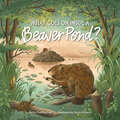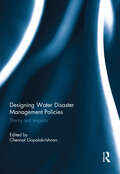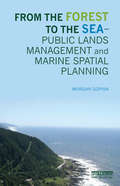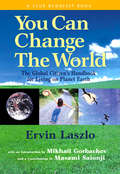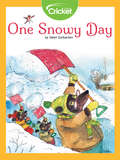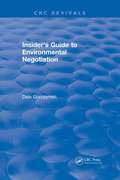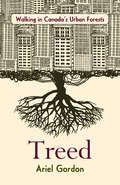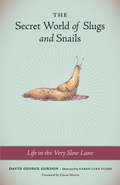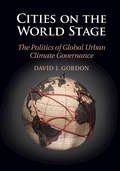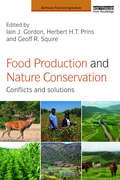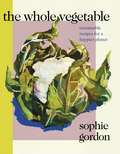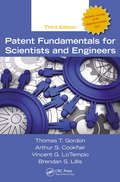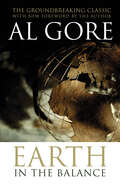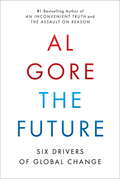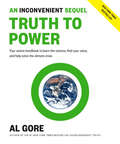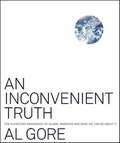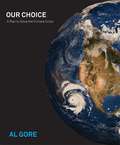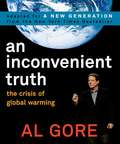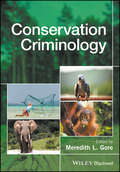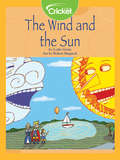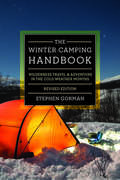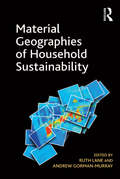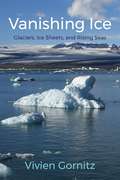- Table View
- List View
Climate System Dynamics and Modelling
by Hugues GoosseThis textbook presents all aspects of climate system dynamics, on all timescales from the Earth's formation to modern human-induced climate change. It discusses the dominant feedbacks and interactions between all the components of the climate system: atmosphere, ocean, land surface and ice sheets. It addresses one of the key challenges for a course on the climate system: students can come from a range of backgrounds. A glossary of key terms is provided for students with little background in the climate sciences, whilst instructors and students with more expertise will appreciate the book's modular nature. Exercises are provided at the end of each chapter for readers to test their understanding. This textbook will be invaluable for any course on climate system dynamics and modeling, and will also be useful for scientists and professionals from other disciplines who want a clear introduction to the topic.
What Goes on inside a Beaver Pond?
by Becky Cushing GopDive into the fascinating world of beavers—the swimmers, builders, and engineers of the animal kingdom! What Goes on inside a Beaver Pond? takes kids ages 8 to 10 on a journey through a year in the life of a young beaver (called a "kit"). This is an exciting year as the young beaver leaves her family lodge and moves throughout the Yokun Brook waterways, seeking a new home for herself. Throughout the seasons, vibrant illustrations and descriptions reveal the hidden inner-workings of a beaver lodge, how beavers fell trees with their teeth and create a wetland habitat, how they collect food and ward off predators, and what daily life is like within a beaver colony. Educational side panels enhance the story with details about beaver behavior and anatomy, as well as information about what other animal inhabitants of the pond are up to throughout the year. Author Becky Cushing Gop is an environmental educator and director of Mass Audubon&’s Pleasant Valley Wildlife Sanctuary where the story takes place. Nature illustrator Carrie Shryock&’s lively and charming graphics bring the young beaver&’s story to life for nature-curious kids.
Designing Water Disaster Management Policies: Theory and Empirics
by Chennat GopalakrishnanThis book represents a landmark effort to probe and analyze the theory and empirics of designing water disaster management policies. It consists of seven chapters that examine, in-depth and comprehensively, issues that are central to crafting effective policies for water disaster management. The author uses historical surveys, institutional analysis, econometric investigations, empirical case studies, and conceptual-theoretical discussions to clarify and illuminate the complex policy process.The specific topics studied in this book include a review and analysis of key policy areas and research priority areas associated with water disaster management, community participation in disaster risk reduction, the economics and politics of ‘Green’ flood control, probabilistic flood forecasting for flood risk management, polycentric governance and flood risk management, drought management with the aid of dynamic inter-generational preferences, and how social resilience can inform SA/SIA for adaptive planning for climate change in vulnerable areas.A unique feature of this book is its analysis of the causes and consequences of water disasters and efforts to address them successfully through policy-rich, cross-disciplinary and transnational papers. This book is designed to help enrich the sparse discourse on water disaster management policies and galvanize water professionals to craft creative solutions to tackle water disasters efficiently, equitably, and sustainably. This book should also be of considerable use to disaster management professionals, in general, and natural resource policy analysts.This book was published as a special issue of the Journal of Natural Resource Policy Research.
From the Forest to the Sea - Public Lands Management and Marine Spatial Planning: Public Lands Management And Marine Spatial Planning
by Morgan GopnikThe management of common pool resources and publicly-owned areas is fraught with difficulty. This book explores the long, complex, and frequently contentious history of public lands management in the United States in order to draw lessons for the emerging field of marine spatial planning (MSP). The author first establishes that these two seemingly different settings are in fact remarkably similar, drawing on established theories of policy analysis. The work then examines the management of US National Forests over the past 120 years, including three place-based case studies, to discover recurring themes. The analysis shows how different management approaches evolved over time in response to changing laws and cultural norms, producing outcomes favored by different constituencies. This history also reveals the ambiguities and contradictions inherent in multiple-use management of any public space. Next, the book analyzes recent efforts to advance MSP, both in the US and globally, showing how they mirror past experiences in National Forest management, including similar disagreements among stakeholders. In conclusion the author suggests how those within ocean-related sectors – government, academia, industry, and environmental groups – might achieve their individual and collective goals more effectively based on lessons from the public lands setting.
You Can Change the World: The Global Citizen's Handbook for Living on Planet Earth
by Mikhail Gorbachev Masami Saionji Ervin LaszloYou Can Change the World: The Global Citizen's Handbook for Living on Planet Earth should be required reading for anyone who cares about the future of the planet. Written by renowned scientist, futurist and Club of Budapest founder Ervin Laszlo, You Can Change the World answers two pertinent questions-first, what is at the root of all the conflict and crisis in today's world? And second, what can actually be done to move toward a world where we can live in peace, without marginalizing and killing each other and destroying the environment?A handbook that urges readers to become global citizens who aspire to live responsibly on this precious but highly exploited and crisis-prone planet, You Can Change the World provides a simple and basic message: in today's world it is neither wealth nor power, nor the control of territory and technology that make the crucial difference. How we think and act shapes our present and decides our future.
One Snowy Day
by Valeri GorbachevThe Bear family is enjoying a snowy day! Follow along as Brother Cub and Sister Cub help Daddy Bear shovel the snow before going sledding!
Insider's Guide to Environmental Negotiation
by Dale GorczynskiA one-of-a-kind book that provides winning strategies from both corporate and environmentalist points of viewInsider's Guide to Environmental Negotiation reflects the author's more than 10 years of experience in environmental negotiation and reveals secrets previously known only to insiders familiar with what is needed to win in this volatile arena. The author has been personally involved in all of today's significant issues, including hazardous waste, environmental health, subsidence and flooding, air quality, and water and wastewater. The book provides critical insight into the negotiation process, both formal and informal, private and public. It also offers valuable tips on techniques, such as using the media to your best advantage and developing effective strategies. This practical, easy-to-read book is invaluable for industry personnel, environmental groups, expert witnesses, government officials, lawyers, lobbyists, consultants, politicians, and anyone else involved in the difficult art of environmental negotiation.
Insider's Guide to Environmental Negotiation
by Dale GorczynskiThis provides winning strategies from both corporate and environmentalist points of view and critical insight into the negotiation process, both formal and informal, private and public.
Treed: Walking in Canada's Urban Forests
by Ariel GordonWith intimacy and humour award-winning poet Ariel Gordon walks through the streets of Winnipeg and into the urban forest that is, to her, the city's heart. From the grackles and cankerworms of spring to the flush of mushrooms on elm stumps in summer and through to the red-stemmed dogwood of winter, she helps us to consider what we expect of nature. Whether it is the effects of climate change on the urban forest or foraging in the city, Dutch elm disease in the trees or squirrels in the living room, Gordon delves into our relationships with the natural world with heart and style. After grounding the book in Winnipeg's native elms and ashes, Gordon travels to BC's northern Rockies, to Banff National Park and to a cattle farm in rural Manitoba before circling back to the forest, where the weather is always better and where one can see how to "remake" even the trees that are lost.
The Secret World of Slugs and Snails
by David George GordonA preeminent expert on the small wonders of the natural world, David George Gordon playfully and thoughtfully sheds light on the fascinating lives of slugs and snails. Covering everything from snail sex to the manufacture of synthetic slug slime, Gordon takes us on a journey through the languid and magical world of these charismatic invertebrates. From essays like Grow Your Own Escargot to indispensable gardening tips, this book is chock-full of information on the much-maligned mollusks. Whether removing non-native slugs from your garden or following a native snail as it meanders across the forest floor, you'll never look at these underdogs the same way again. David George Gordon is the author of nineteen books about the natural world, including the best-selling Eat-a-Bug Cookbook and The Compleat Cockroach. Karen Luke Fildes is an accomplished artist who has studied at both the Art Institute of Seattle and Chapman University. Both live in Seattle.
Cities on the World Stage: The Politics of Global Urban Climate Governance
by David J. GordonCities are playing an ever more important role in the mitigation and adaption to climate change. This book examines the politics shaping whether, how and to what extent cities engage in global climate governance. By studying the C40 Cities Climate Leadership Group, and drawing on scholarship from international relations, social movements, global governance and field theory, the book introduces a theory of global urban governance fields. This theory links observed increases in city engagement and coordination to the convergence of C40 cities around particular ways of understanding and enforcing climate governance. The collective capacity of cities to produce effective and socially equitable global climate governance is also analysed. Highlighting the constraints facing city networks and the potential pitfalls associated with a city-driven global response, this assessment of the transformative potential of cities will be of great interest to researchers, graduate students and policymakers in global environmental politics and policy.
Food Production and Nature Conservation: Conflicts and Solutions (Earthscan Food and Agriculture)
by Iain J. Gordon Herbert H.T. Prins Geoff R. SquireFeeding the world's growing human population is increasingly challenging, especially as more people adopt a western diet and lifestyle. Doing so without causing damage to nature poses an even greater challenge. This book argues that in order to create a sustainable food supply whilst conserving nature, agriculture and nature must be reconnected and approached together. The authors demonstrate that while the links between nature and food production have, to some extent, already been recognized, until now the focus has been to protect one from the impacts of the other. Instead, it is argued that nature and agriculture can, and should, work together and ultimately benefit from one another. Chapters describe efforts to protect nature through globally connected protected area systems and illustrate how farming methods are being shaped to protect nature within agricultural systems. The authors also point to many ways in which nature benefits agriculture through the ecosystem services it provides. Overall, the book shows that nature conservation and food production must be considered as equally important components of future solutions to meet the global demand for food in a manner that is sustainable for both the human population and the planet as a whole.
The Whole Vegetable: Sustainable and delicious vegan recipes
by Sophie GordonDiscover wholesome, sustainable and plant-based dishes in this essential cookbook, perfect for anyone looking to reduce their waste this year!'Hearty, healthy, flavour-packed dishes' MAIL ON SUNDAY'A uniquely sustainable and delicious approach to modern plant-based cooking' VOGUE'The Whole Vegetable blew me away . . . Full of inventive waste-free recipes' Tom Hunt, GUARDIAN_________Have you ever wondered how to make your diet truly eco-conscious?In this beautiful plant-based cookbook, over 130 creative, delicious, planet-friendly recipes put vegetables at the very centre of the table. Embracing often-discarded parts such as leaves, stalks, tops, flowers, seeds and even peelings, this is cooking at its most sustainable.In The Whole Vegetable, Sophie Gordon shows us how to:- Cook with every part of every vegetable- Reduce waste in your cooking- Reinvent your leftovers- Eat with the seasonsFrom Cauliflower Carbonara, Broccoli Pesto and Chunky Pumpkin Tacos, to Cherry Breakfast Crumble, Maple-Roasted Pears and Apple & Walnut Danish Buns, The Whole Vegetable is packed with thoughtful recipes for every season.Most of all, it will ensure that nothing in your kitchen goes to waste._________'Creative, delicious, planet-friendly recipes . . . Teaches you how to put those often discarded parts of fruit and veg to good (and tasty) use' Women's Health'Wow, Sophie Gordon's . . . The Whole Vegetable blew me away. I wonder if she is the next Anna Jones. A seasonal, plant-centric, whole food recipe book without ultra-processed vegan ingredients. The recipes are super-inventive and importantly waste free!' Eco-Chef Tom Hunt'The Whole Vegetable heroes plant-based cookery, with recipes that also help reduce food waste in the kitchen and improve sustainable living. A worthwhile read' Good Housekeeping
Patent Fundamentals for Scientists and Engineers
by Thomas T. Gordon Arthur S. Cookfair Vincent G. LoTempio Brendan S. LillisThe most significant overhaul of the U.S. patent laws in decades occurred with the recent passage of the Leahy-Smith America Invents Act (AIA). Understanding the law that dictates what a patent is and how a patent is obtained and enforced, and the recent changes through statute or case law litigation presents unique challenges. This third edition o
Earth in the Balance: Forging a New Common Purpose (Plume Ser.)
by Al GoreAl Gore leads the charge against climate change, the world's greatest threat, in an incendiary new foreword to this timeless classic that launched his environmental career. If you want to know Gore, you need this book!
The Future: Six Drivers of Global Change
by Al GoreFrom the former vice president and #1 New York Times bestselling author comes An Inconvenient Truth for everything--a frank and clear-eyed assessment of six critical drivers of global change in the decades to come. Ours is a time of revolutionary change that has no precedent in history. With the same passion he brought to the challenge of climate change, and with his decades of experience on the front lines of global policy, Al Gore surveys our planet's beclouded horizon and offers a sober, learned, and ultimately hopeful forecast in the visionary tradition of Alvin Toffler's Future Shock and John Naisbitt's Megatrends. In The Future, Gore identifies the emerging forces that are reshaping our world: * Ever-increasing economic globalization has led to the emergence of what he labels "Earth Inc."--an integrated holistic entity with a new and different relationship to capital, labor, consumer markets, and national governments than in the past. * The worldwide digital communications, Internet, and computer revolutions have led to the emergence of "the Global Mind," which links the thoughts and feelings of billions of people and connects intelligent machines, robots, ubiquitous sensors, and databases. * The balance of global political, economic, and military power is shifting more profoundly than at any time in the last five hundred years--from a U.S.-centered system to one with multiple emerging centers of power, from nation-states to private actors, and from political systems to markets. * A deeply flawed economic compass is leading us to unsustainable growth in consumption, pollution flows, and depletion of the planet's strategic resources of topsoil, freshwater, and living species. * Genomic, biotechnology, neuroscience, and life sciences revolutions are radically transforming the fields of medicine, agriculture, and molecular science--and are putting control of evolution in human hands. * There has been a radical disruption of the relationship between human beings and the earth's ecosystems, along with the beginning of a revolutionary transformation of energy systems, agriculture, transportation, and construction worldwide. From his earliest days in public life, Al Gore has been warning us of the promise and peril of emergent truths--no matter how "inconvenient" they may seem to be. As absorbing as it is visionary, The Future is a map of the world to come, from a man who has looked ahead before and been proven all too right.
An Inconvenient Sequel: Your Action Handbook to Learn the Science, Find Your Voice, and Help Solve the C limate Crisis
by Al GoreA New York Times bestseller!The follow up to the #1 New York Times bestselling An Inconvenient Truth and companion to Vice President Al Gore’s new documentary, An Inconvenient Sequel: Truth to Power, this new book is a daring call to action. It exposes the reality of how humankind has aided in the destruction of our planet and delivers hope through groundbreaking information on what you can do now.Vice President Gore, one of our environmental heroes and a leading expert in climate change, brings together cutting-edge research from top scientists around the world; approximately 200 photographs and illustrations to visually articulate the subject matter; and personal anecdotes and observations to document the fast pace and wide scope of global warming. He presents, with alarming clarity and conclusiveness (and with humor, too) that the fact of global climate change is not in question and that its consequences for the world we live in will be assuredly disastrous if left unchecked. Follow Vice President Gore around the globe as he tells a story of change in the making. He connects the dots of Zika, flooding, and other natural disasters we’ve lived through in the last 10+ years—and much more. The book also offers a comprehensive how-to guide on exactly how we can change the course of fate. With concrete, actionable advice on topics ranging from how to run for office to how to talk to your children about climate change, An Inconvenient Sequel will empower you to make a difference—and lets you know how exactly to do it. Where Gore’s first documentary and book took us through the technical aspects of climate change, the second documentary is a gripping, narrative journey that leaves you filled with hope and the urge to take action immediately. This book captures that same essence and is a must-have for everyone who cares deeply about our planet.
An Inconvenient Truth: The Planetary Emergence of Global Warming and What We Can Do About It
by Al GoreOur climate crisis may appear to be happening slowly but in fact it is happening very quickly, and has become a true planetary emergency.
Our Choice: A Plan to Solve the Climate Crisis
by Al GoreIt is now abundantly clear that we have at our fingertips all of the tools we need to solve the climate crisis. The only missing ingredient is collective will. Properly understood, the climate crisis is an unparalleled opportunity to finally and effectively address many persistent causes of suffering and misery that have long been neglected, and to transform the prospects of future generations, giving them a chance to live healthier, more prosperous lives as they continue their pursuit of happiness. Our Choice gathers in one place all of the most effective solutions that are available now and that, together, will solve this crisis. It is meant to depoliticize the issue as much as possible and inspire readers to take action - not only on an individual basis but as participants in the political processes by which every country, and the world as a whole, makes the choice that now confronts us. There is an old African proverb that says, "If you want to go quickly, go alone; if you want to go far, go together." We have to go far, quickly. We can solve the climate crisis. It will be hard, to be sure, but if we can make the choice to solve it, I have no doubt whatsoever that we can and will succeed. - Al Gore, from the introduction.
An Inconvenient Truth: The Crisis of Global Warming (Adapted)
by Al Gore Jane O'ConnorFormer Vice President Al Gore's New York Times #1 bestselling book is a daring call to action, exposing the shocking reality of how humankind has aided in the destruction of our planet and the future we face if we do not take action to stop global warming. Now, Viking has adapted this book for the most important audience of all: today's youth, who have no choice but to confront this climate crisis head-on. Dramatic full-color photos, illustrations, and graphs combine with Gore's effective and clear writing to explain global warming in very real terms: what it is, what causes it, and what will happen if we continue to ignore it. An Inconvenient Truth will change the way young people understand global warming and hopefully inspire them to help change the course of history. .
Conservation Criminology
by Meredith L. GoreThis important new text introduces conservation criminology as the interdisciplinary study of environmental exploitation and risks at the intersection of human and natural systems. Taking an interdisciplinary approach, the book enhances understanding of the various human and organizational behaviors that pose risks to the environment, humans, and drive conservation crime. As human population growth, global market economies, climate change, deforestation, and illegal exploitation of natural resources continue to increase, academic research from numerous disciplines is needed to address these challenges. Conservation Criminology promotes thinking about how unsustainable natural resources exploitation is a cause and a consequence of social conflict. Case studies profiled in the book demonstrate this cause and effect type situation, as well as innovative approaches for reducing risks to people and the environment. This text encourages readers to consider how humans behave in response to environmental risks and the various mechanisms that constitute effective and ineffective approaches to enforcement of wildlife crimes, including environmental and conservation policy. Case studies from the USA, Latin America, Africa, and Asia highlight corruption in conservation, global trade in electronic waste, illegal fishing, illegal logging, human-wildlife conflict, technology and space, water insecurity, wildlife disease, and wildlife poaching. Taken together, chapters expand the reader’s perspective and employ tools to understand and address environmental crimes and risks, and to provide novel empirical evidence for positive change. With established contributors providing interdisciplinary and global perspectives, this book establishes a foundation for the emerging field of conservation criminology.
The Winter Camping Handbook: Wilderness Travel & Adventure in the Cold-Weather Months
by Stephen GormanA thoroughly updated edition of the classic guide, considered the authoritative resource for winter camping Winter camping has its own special allure: the splendid quiet of a winter forest, the hush of falling snow, the thrill of gliding over ice and snow on skis. From building a snow shelter to traveling comfortably in sub-zero temperatures, The Winter Camping Handbook covers everything you'll need to know in order to enjoy wilderness travel and adventure in the colder months. Extremely user-friendly, the book's step-by-step approach covers everything from choosing a location to explore, selecting teammates, planning the trip, winterizing a travel vehicle, gear selection, making camp, food and nutrition, dealing with winter safety concerns, and even camping with children. Now revised and updated to include tips for using smartphones and the latest GPS navigation, this is the definitive guide to cold-weather hiking and camping.
Material Geographies of Household Sustainability
by Andrew Gorman-MurrayCharting new research directions, this book constructs a series of imperatives for linking culturally informed research around household sustainability with policy and planning. The household, or 'home', is a critical scale for understanding activities that connect individual behaviours and societal attitudes. The focus on the household in this collection provides a window into the sheer diversity of homemaking and maintenance activities that entail resource use. These practices have affective or emotive dimensions as well as habitual aspects. Diversity, innovation and change at the household scale is often missed in policy approaches which assume that simplistic economic motivations drive demand and this can in turn be 'managed' through regulation or market pricing. The research challenge extends beyond describing existing unsustainable economies driving resource intensive behaviour to consider realistic options for transformations in cultural practices, material relationships and, ultimately, the political economies they sit within. Without change in these systems, government initiatives to promote ecological modernisation run the risk of simply green-washing the very economies of consumption that currently drive unsustainable practices. Social and cultural change at the household level is critical to promoting sustainability at a range of wider scales.
Vanishing Ice: Glaciers, Ice Sheets, and Rising Seas
by Vivien GornitzThe Arctic is thawing. In summer, cruise ships sail through the once ice-clogged Northwest Passage, lakes form on top of the Greenland Ice Sheet, and polar bears swim farther and farther in search of waning ice floes. At the opposite end of the world, floating Antarctic ice shelves are shrinking. Mountain glaciers are in retreat worldwide, unleashing flash floods and avalanches. We are on thin ice—and with melting permafrost’s potential to let loose still more greenhouse gases, these changes may be just the beginning.Vanishing Ice is a powerful depiction of the dramatic transformation of the cryosphere—the world of ice and snow—and its consequences for the human world. Delving into the major components of the cryosphere, including ice sheets, valley glaciers, permafrost, and floating ice, Vivien Gornitz gives an up-to-date explanation of key current trends in the decline of ice mass. Drawing on a long-term perspective gained by examining changes in the cryosphere and corresponding variations in sea level over millions of years, she demonstrates the link between thawing ice and sea-level rise to point to the social and economic challenges on the horizon. Gornitz highlights the widespread repercussions of ice loss, which will affect countless people far removed from frozen regions, to explain why the big meltdown matters to us all. Written for all readers and students interested in the science of our changing climate, Vanishing Ice is an accessible and lucid warning of the coming thaw.

